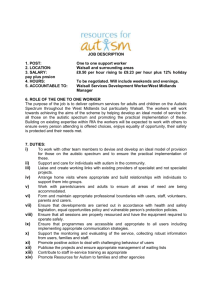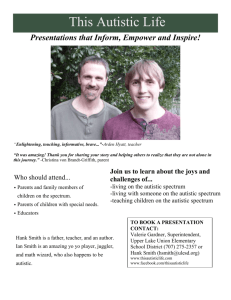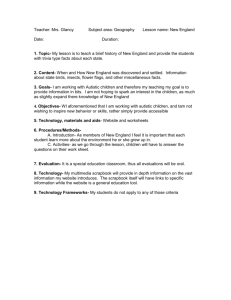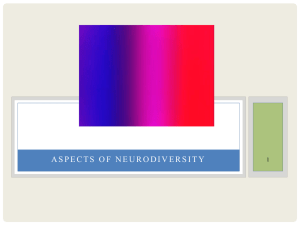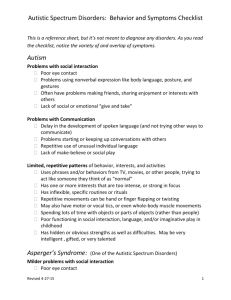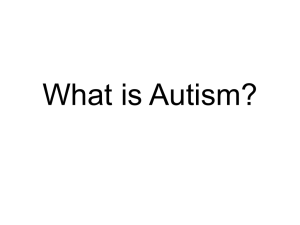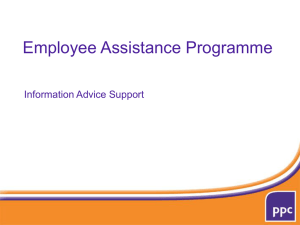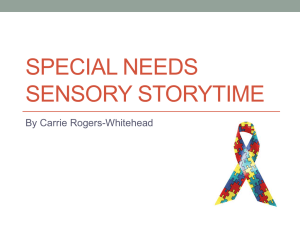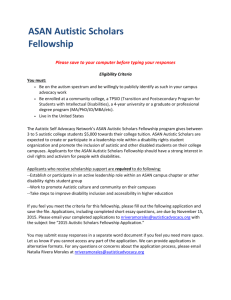Presentation - Gareth Morewood
advertisement
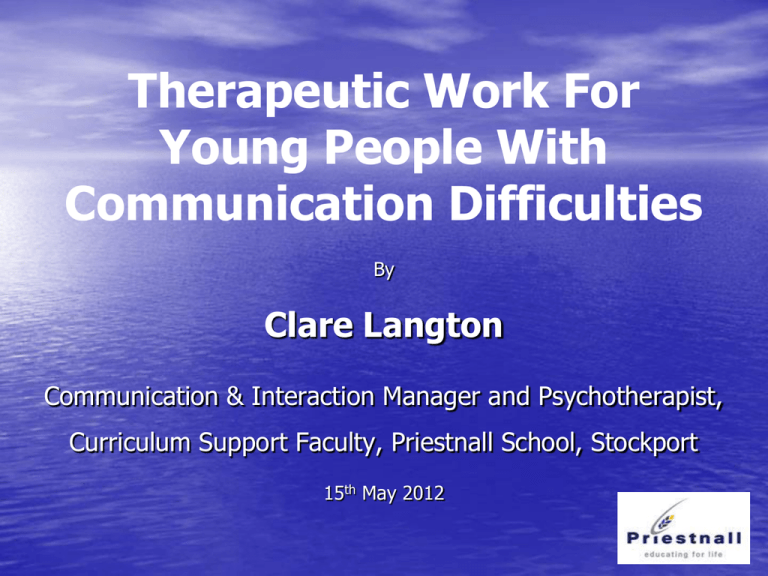
Therapeutic Work For Young People With Communication Difficulties By Clare Langton Communication & Interaction Manager and Psychotherapist, Curriculum Support Faculty, Priestnall School, Stockport 15th May 2012 Background • My role within Priestnall • Person Centred Approach • Difficulties experienced by students on the autistic • • • • • spectrum Gaining a greater understanding of diagnosis and what it means to the young person Why counselling / therapeutic intervention? Therapeutic relationship Personal observations and experiences Students own views and thoughts Does Every Child STILL Matter? • Being Healthy • Staying Safe • Enjoying and Achieving • Making a Positive Contribution • Economic Wellbeing My Background • I work as a Psychotherapist as part of my role • • within a mainstream secondary school As an inclusive school I work with students from a large cross-section of our community, including young people with autism My theoretical background is based in Carl Rogers’ Person Centred, Humanistic approach first championed in the 1930’s & 40’s Humanistic Approach • The Humanistic approach to counselling and psychotherapy was borne out of the desire of some practitioners to move away from the limitations of a more clinical diagnosis, that a person is ‘bad’ or ‘ill’ requiring a ‘prescribed’ therapy, but rather allowing them to look at the human being and the meaning of their behaviour and the nature of healthy growth “as material is given by the client it is the therapists function to help him recognise the emotions he feels” (Rogers C. Client Centred Therapy .1951) Person Centred Approach • The fundamental philosophy underpinning • • Rogers’ theory is that all humans are basically good and given the right conditions are motivated to grow and reach their full potential Rogers believed that no two humans are the same and personalities are complex He believed emphasis should focus on the client’s ability for self-understanding and selfhealing Autism and Psychotherapy • Counselling students on the autistic spectrum presents • • • its own unique set of challenges Young people on the autistic spectrum may have average or above average intelligence but also a significant impairment when it comes to social understanding and communication They may also experience significant impairment with emotional expression, regulation and recognition They can appear ‘odd’ in their behaviour and sometimes aloof or selfish, preferring their own company Cont….. “ We have to be open to knowing that person’s experience from his or her perspective” (Jacobson 2003) • When working with students on the autistic • spectrum personal experience has highlighted that it is not always easy to understand what they are thinking Using my own frame of reference and experience each case is unique to the individual • Being different and • • • not understanding why What does he mean? Why is he talking to me? Why does he want to know what I did at the weekend it’s none of his business? Experiences of young people on the autistic spectrum • Comments / behaviour can appear selfish or uncaring • Can be very attached to important people in their lives • Cannot see why they should acknowledge someone who has no • • • • • • • bearing on their life (from their perspective) Can be very happy when they please others Can be very ‘down’ if they disappoint themselves or others Other people’s behaviour, happiness, disappointments can be a mystery to them Can be aware they are ‘odd’ or different Can be unaware they are ‘odd’ or different Have very specific areas of skill Love routine and order Understanding Diagnosis There are four common reactions to receiving a diagnosis of ASC (autistic spectrum condition) • Reactive depression (Attwood 2006) – perception that ASC diagnosis means they are defective in some way, a failure, loser, maybe shouldn’t even be here • Escape into imagination • Denial and arrogance – belief that ‘I am always right’ or they are in some way superior to everyone else • Imitation What an autistic person experiences within society • • • • • • • Anger / frustration Isolation Anxiety / stress Depression Being misunderstood Confusion / bewilderment Inability to cope with unpredictable situations Cont…….. The above difficulties are all barriers to communicating and understanding effectively and further pressures such as: – Duty / expectation from others i.e. ‘I shouldn’t have to tell you…’ – Non verbal body language – Social etiquette only serve to make social integration even more difficult and confusing Working towards integration…. Why Counselling / Therapeutic Intervention? • Behavioural interventions have been at the forefront of • • • addressing the deficit in core behavioural issues for some time with much success Young people are better able to manage and participate in mainstream communities However, emotional issues do not necessarily receive the same attention and this can lead to anxiety and depression (Jacobson 2003) With current focus being on behavioural issues, emotional issues can go unnoticed or unrecognised What can Counselling / Therapy Offer? • A new way of thinking; a new approach • They are in their own world that they understand, trying to • • • • survive and make sense of a world that is ‘alien’ to them It is important to be able to help them understand / get to know this chaotic environment (as they think) through supportive, understanding of their experiences and frustrations Support to gain insight into thoughts, feelings, intentions of others as well as themselves Develop greater maturity Explore memories of blame, being misunderstood, bullying and injustices which continue to ‘interfere’ with daily life Understanding Counselling from an Autistic Perspective “The methods of analysis used in traditional therapy are based on conceptualisation of the development of typical children but children with ASC perceive and relate to a very different world” (Attwood 2007) Often, when working with young people with ASC they tell me that they received a diagnosis and been taught lots of coping strategies. However, no-one has ever sat down with them and asked them what it is like to be autistic or why they are always so angry... Starting Point for Counselling / Therapy An explanation of what autism is and how it can impact on them as an individual and also their impact on others, is a great starting point. It opens up an avenue for them to explore: • • • • • What it is like to be them Benefits of ASC Difficulties in having an ASC How they think and how that differs from others Expectation from others that they will get over it Developing a Counselling / Therapeutic Relationship • To be able to work with ASC in a counselling or therapeutic way you need a thorough understanding of the nature of autism and Asperger’s Syndrome. • Developing a rapport with the young person is essential • Identifying hobbies or areas of interest is helpful • Have a genuine interest in who they are • It is important for them to understand you are on ‘their team’ Accessing this kind of relationship leads to… • • • • • • Reduced anxiety Optimism Being more relaxed Realistic appreciation of who they are An ability to acknowledge strengths and weaknesses Greater understanding of autism and how it forms who they are – their ‘self’ Cont… • Better understanding of how and why • • • coping strategies work Increased awareness and acceptance of who they are and how they ‘fit in’ Greater awareness of how their words and actions can affect how others think and feel Can reduce self-doubt and self-criticism, which can otherwise lead to depression Cont… Much time is spent trying to understand: • each others perspective on a situation • others response to their behaviour • their response to others behaviour • discovering their interests / skills and using them to good effect • their frustrations and anger • overwhelming feelings and being confused • how to repair broken relationships Student Testimonials • I cannot believe how • • • angry I used to be. It is hard to believe that it was me who drew that picture. Anger filled my life. I was always angry but could never understand why. I used to think in terms of weapons of mass destruction to solve my problems. Things make more sense now. If people laughed at me I would explode and hit out. My anger would take over. Now I can put things into perspective. It doesn’t mean I agree with what’s happening but I do understand better what’s going on. My testimonial • NEVER A DULL MOMENT! • No two days are the same... • I am privileged to work with such amazing, colourful, • • • • insightful, humorous, interesting young people... I am constantly in awe of their ability to grow and adapt in a world that often misunderstands them... They encourage change and understanding from others towards them... Watching them grow and develop their self-esteem has been one of the most rewarding aspects of my work... Ultimately, I continue to marvel at what they have taught and continue to teach me... Further Reading • The Complete Guide to Asperger’s Syndrome – Tony Attwood, 2007. Jessica Kingsley Publishing • Aspergergirls, Empowering Females with Asperger Syndrome – Rudy Simone 2010. Jessica Kingsley Publishing • Counselling People on the Autistic Spectrum, A Practical Manual – Paxton, K and Estay, A 2007. Jessica Kingsley Publishing • Asperger Syndrome & Psychotherapy, Understanding Asperger Perspectives – Paula Jacobson 2003. Jessica Kingsley Publishinng Further information Gareth D Morewood Director of Curriculum Support, Priestnall School www.gdmorewood.com Thank you for listening... Clare Langton Communication & Interaction Manager and Psychotherapist, Priestnall School, Stockport
